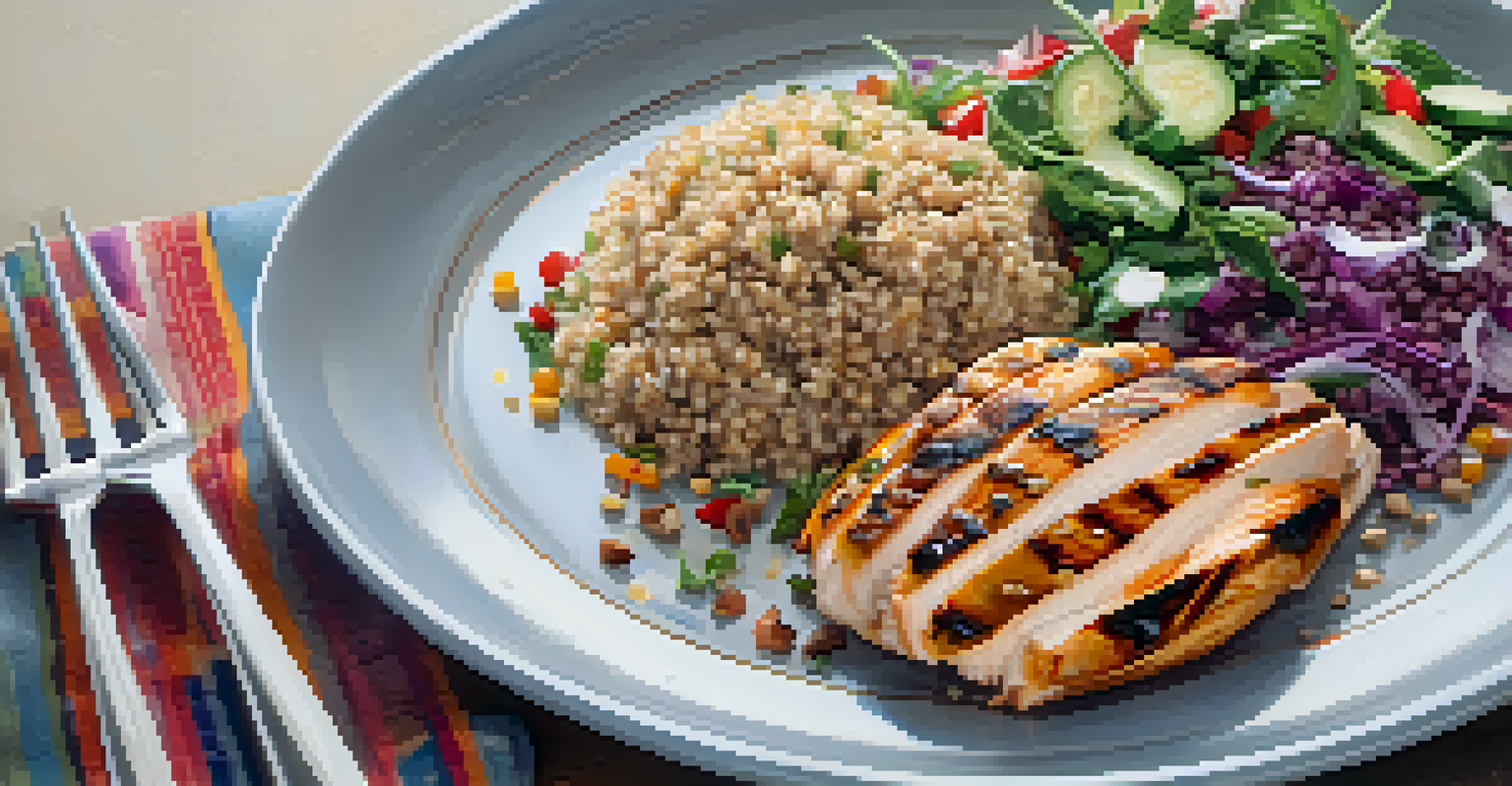Exploring the Link Between Nutrition and Physical Activity

The Essential Role of Nutrition in Physical Activity
Nutrition is the cornerstone of physical activity, providing the fuel your body needs to perform. Just like a car requires gasoline to run, your muscles need carbohydrates, proteins, and fats to function effectively. If you're engaging in regular exercise, the quality and quantity of your food become even more critical to ensure peak performance.
Let food be thy medicine and medicine be thy food.
For instance, think of a marathon runner who relies heavily on carbohydrates for energy. Without sufficient carbs, their performance could falter, resulting in fatigue and decreased endurance. This shows just how intertwined nutrition is with physical capabilities, highlighting the need for a balanced diet tailored to your activity levels.
Moreover, proper nutrition aids in recovery after workouts. Consuming the right nutrients post-exercise can reduce muscle soreness and replenish energy stores, allowing you to train harder and more effectively in the future. This synergistic relationship showcases the importance of a well-rounded diet in any fitness regimen.
How Macronutrients Support Physical Performance
Macronutrients—carbohydrates, proteins, and fats—play distinct roles in supporting physical performance. Carbohydrates are the primary source of energy, particularly during high-intensity activities, while proteins are essential for muscle repair and growth. Fats, though often misunderstood, provide a vital source of energy during prolonged, lower-intensity exercises.

To illustrate, consider a cyclist who relies on carbohydrates for quick bursts of speed but benefits from fat stores during long rides. This balance of macronutrients is crucial for optimizing performance across various activities, making it essential to adjust your intake based on your workout type.
Nutrition Fuels Physical Performance
A balanced diet is crucial for optimizing energy and enhancing physical capabilities during exercise.
Additionally, understanding your individual needs is key. Everyone's body responds differently to different diets, so experimenting with macronutrient ratios can help you find what works best for your personal fitness goals. Tailoring your nutrition to complement your physical activity can lead to enhanced performance and overall well-being.
Hydration: An Often Overlooked Component
Hydration is another crucial element that directly impacts physical performance and overall health. Often overlooked, water plays a vital role in digestion, nutrient absorption, and temperature regulation. Dehydration can lead to fatigue, decreased coordination, and even serious health risks during physical activities.
You are what you eat, so don’t be fast, cheap, easy, or fake.
For example, think about a hot summer day spent running outside. Without adequate hydration, your body struggles to cool itself down, leading to diminished performance and increased risk of heat-related illnesses. It’s a reminder that simply drinking water isn’t enough; you need to stay attuned to your body’s signals.
To maintain optimal hydration, consider your activity level, environmental conditions, and individual needs. Incorporating electrolyte-rich drinks during intense workouts can also help replenish lost minerals, ensuring that your body stays in peak condition. Remember, hydration is not just about quenching your thirst; it's about supporting your physical health.
The Impact of Nutrient Timing on Performance
Nutrient timing refers to the strategic consumption of food and drinks around your workouts to maximize performance and recovery. Eating the right foods before, during, and after exercise can significantly influence your results. For instance, a pre-workout meal rich in carbohydrates can provide the energy needed for an intense session.
During exercise, especially long-duration activities, consuming quick-digesting carbs can help sustain energy levels. Post-workout nutrition, which ideally includes protein and carbs, is essential for muscle recovery and glycogen replenishment. This highlights the importance of not just what you eat, but when you eat it.
Hydration is Key for Health
Proper hydration supports digestion, nutrient absorption, and performance, making it essential during physical activities.
Experimenting with nutrient timing can be a game-changer for many athletes. By paying attention to how your body responds to different foods at various times, you can create a personalized nutrition strategy that enhances your performance and promotes recovery. It's about finding a rhythm that works for you.
The Psychological Connection Between Nutrition and Exercise
The relationship between nutrition and physical activity isn't just physical; it's psychological too. The right fuel can enhance mood, motivation, and overall mental well-being, making it easier to stick with an exercise routine. Conversely, poor nutrition can lead to feelings of lethargy and demotivation, making it hard to engage in physical activities.
For example, a healthy breakfast can set a positive tone for the day, boosting energy levels and encouraging you to hit the gym later. In contrast, a heavy, greasy meal might leave you feeling sluggish and disinterested in exercise. This connection emphasizes the importance of nutrition not just for physical fitness, but for mental health as well.
Furthermore, adopting a balanced diet can build a positive feedback loop, where feeling good about your food choices encourages you to maintain an active lifestyle. It’s a cycle that promotes both physical health and emotional well-being, demonstrating how intertwined these aspects of our lives truly are.
The Role of Supplements in Nutrition and Exercise
Supplements can sometimes play a role in enhancing your nutrition, especially for those with specific dietary restrictions or increased nutritional needs due to intense physical activity. However, it's essential to approach supplementation with caution and prioritize whole foods first. Vitamins, minerals, and other nutrients are best absorbed through a balanced diet rich in fruits, vegetables, whole grains, and lean proteins.
For example, athletes might consider protein powder to help meet their protein needs, particularly after workouts. However, relying solely on supplements can lead to imbalances and missed opportunities for nutrient diversity. It’s always wise to consult with a healthcare professional before adding any supplements to your routine.
Timing Matters for Nutrient Intake
Strategic consumption of food around workouts can significantly influence energy levels and recovery.
Ultimately, while supplements can be beneficial, they should complement—not replace—a healthy diet. By focusing on nutrient-dense foods, you can create a solid foundation for your nutrition that supports your physical activity and overall health.
Creating a Balanced Nutrition Plan for Active Lifestyles
Designing a balanced nutrition plan tailored to your active lifestyle is essential for achieving optimal results. Start by assessing your individual needs based on your activity level, goals, and dietary preferences. This may involve tracking your food intake and adjusting portions to ensure you're fueling your body appropriately.
Consider incorporating a variety of foods from all food groups, ensuring that you receive a broad spectrum of nutrients. Meal prepping can also be a helpful strategy, allowing you to plan ahead and avoid last-minute unhealthy choices. This proactive approach can help you stay on track with your dietary goals.

Lastly, remember that balance is key. It’s okay to enjoy your favorite treats occasionally; the aim is to create a sustainable nutrition plan that supports your physical activity without feeling restrictive. By prioritizing wholesome foods and being mindful of your overall intake, you can foster a healthier relationship with food and exercise.